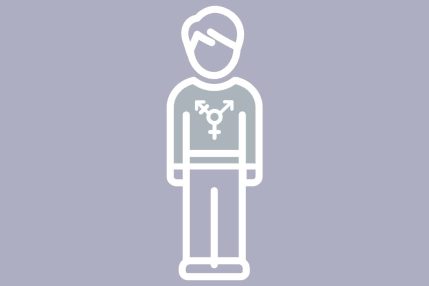17 May 2024
Gender dsyphoria can raise challenging issues emotionally, medically and legally when individuals seek to transition from female to male, male to female or assume a non-binary identity (neither exclusively male nor female). The recent gender dysphoria case in the High Court involving a young person aged 16 1/2 seeking cross-hormone therapy treatment Re J (Transgender: Puberty Blocker and Hormone Replacement Therapy) [2024] EWHC 922 brings into sharp focus complex and evolving issues around capacity and consent to medical treatment and the extent to which the court should intervene and override consent by an over-16-year-old but under 18-year-old.
Background
The case which came before the President of the Family Division, Sir Andrew McFarlane, on 1 May 2024 concerned ‘J’, an individual aged 16 1/2 years. J was assigned female at birth but considered himself male. In 2018, his parents divorced and he lived with his mother and had regular contact with his father. J experienced difficulties with his mental health and had since 2020 been diagnosed with anorexia and autistic spectrum disorder. He self-harmed and in September 2021 he was detained under the Mental Health Act 1983 section 3 for treatment for 9 months. J did not attend mainstream school during 2021 and 2022, but was able to return to school in 2023.
In October 2022, with the support of his mother, J first engaged with an offshore, online, healthcare resource for transgender patients called Gender GP. An initial fee was paid and J completed a questionnaire. By the end of December 2022, Gender GP told J and his mother that the ‘appraisal pathway’ for treatment was completed and it issued a private prescription for puberty blockers and testosterone. During the ‘appraisal pathway’ (lasting 2 months), J only had direct communication with one representative of Gender GP, being an unregistered counsellor. J proceeded with the hormone therapy treatment only starting in January 2023, with his local NHS GP administering the first injection of testosterone. In April 2023, J’s father applied under section 8 Children Act 1989 and the inherent jurisdiction of the High Court for the court to intervene to stop J being treated with puberty blockers and cross-sex hormones without the court’s approval and only once the court was satisfied that the treatment was in J’s best interests.
The case was further complicated by concerns that the treatment regime established at the start was through an internet provider, Gender GP, and not through the NHS. Serious concerns were raised during the proceedings about the high dosage of testosterone prescribed to J by Gender GP. The medical expert appointed within the proceedings described the dosage as ‘dangerously high’ and reported that J was ‘presently at risk of sudden death due to thromboembolic disease’ as the hormone had the potential to cause thickening of the blood. The medical expert went on to say that she had never before (in her 20 years of medical practice) seen such a ‘massive dose’ of testosterone given to a young person. She went on to raise concerns about the impact that such a high dosage could have on J’s bones. The high dosage accelerated skeletal development beyond its normal pace of growth during puberty bringing forward the point at which the bones fuse and stop growing. She reported that this had the potential for an adult to have a shorter and smaller frame than would have been the case with a normal span of bone growth. Added to this, the options for J’s future treatment and care for gender dsyphoria were severely limited because the previous NHS provision at the Tavistock Clinic was no longer available and replacement services had yet to start taking on patients. The only other option was for J to engage with the newly opened Gender Plus clinic in London where an assessment lasting six months would aim to identify what, if any, treatment the clinic could offer J.
Principal Issues
Moving forward, all parties accepted that J had capacity to participate in an assessment process with Gender Plus clinic in London. Furthermore, there was no decision at the current time for J to make other than to participate in an assessment process. However, depending upon the outcome of the further assessment and/or if J’s testosterone levels dropped then a further interim dose may be needed before the assessment was completed at which point the issue of a further prescription from Gender GP (an unregulated online clinic with no certainty about the details of that treatment or the particular dosage appropriate for J at that time) would become live. As such, the purpose of this Judgment was to ‘take stock of the issues and evidence to date, rather than making any final determination at this stage’.
The judgment also provided a brief description of the legal position under English law relating to consent to medical treatment by young people and those aged 16 to 18 years. Under the age of 16 years,where a child is considered to have sufficient maturity and understanding to consent to medical treatment (namely ‘Gillick competent’) clinicians can use the child’s consent to proceed without the need to obtain a parent’s consent.
Where a child aged under 16 years is not considered to be Gillick competent, a parent with parental responsibility can ordinarily provide consent to medical treatment for him/her under the Children Act 1989.
Where a young person is over 16 but under 18 years and does not have mental capacity to consent to medical treatment the provisions of the Mental Capacity Act 2005 apply, which states at section 2(1) ‘… a person lacks capacity in relation to a matter if at the material time he is unable to make a decision for himself in relation to the matter because of an impairment of, or a disturbance in functioning of, the mind or brain’. If the court determines they lack capacity it will then proceed to determine the issues in question in accordance with the young person’s best interests.
The Father’s Case
The father’s case was that treatment with puberty blockers and cross-sex hormones from January 2023 should not have started in J’s case without the prior approval of the court. He asserted that the court’s jurisdiction should be expanded beyond its current boundaries concerning puberty blocker and/or cross-sex hormone treatment for any person under the age of 18 years. He also raised issues and sought guidance about the approach that the court should adopt where there are disputed issues in what remains a developing area of law concerning:
- A young person’s competence to consent to such medical treatment.
- The right to control and make decisions about the diagnosis of gender dsyphoria.
- The right to control and make decisions about treatment given by an internet provider not regulated by the Care Quality Commission (CQC) and operating without the protections provided by care through the NHS.
The father’s case was also that the treatment provided to J by Gender GP was:
- Not in accordance with any recognised guideline.
- Provided by an online provider without any proper medical supervision.
- Of a kind which would not be available in former or current mainstream NHS service provision.
- Was one to which J, aged 15 1/4 (when he started treatment) and now aged 16, was not competent to consent to having regard to the serious, lifelong and irreversible nature of the treatment and J’s underlying diagnoses of autism and anorexia.
- Not in J’s best interests.
The Mother’s Case
The mother’s aim was for the court to approve for J to be referred to the new clinic (Gender Plus in London) for an assessment. The mother undertook not to contact Gender GP for further treatment for J, except to pay the monthly retainer fee to keep the referral open. If following an assessment with Gender Plus it did not lead to treatment and no other options were available, then the case would return to court for a decision on further involvement by Gender GP.
The Guardian’s Case
J’s appointed Guardian had been involved with the case for nearly a year by the time of this Judgment. Whilst leaving the issue of capacity and consent for the court to determine, she was clearly of the view that it was in J’s best interests to access further hormone treatment for gender dysphoria. As such, she supported an assessment being undertaken by Gender Plus and submitted that it was too early for the court to determine any issue of capacity to consent to treatment by either Gender Plus or Gender GP at this stage because the former requires an extensive assessment and the latter did not arise as a live option. Furthermore, it was not necessary at this stage for the court to engage with the father’s wider legal case or offer general guidance.
Conclusions
The Judge elected to limit the court’s involvement and decision making to that which is currently necessary. He went on to say that “The law, and the approach of the courts, with respect to issues arising in cases of gender dysphoria is still very much in the process of development. In the absence of intervention by Parliament, the court should be careful to move forward on a case by case, decision by decision, basis so that the approach under the common law is developed incrementally as may be required, rather than by judicial diktat”.
The Judge ruled that it may in time be necessary to decide whether J has capacity to consent to further treatment from Gender GP and if so it may be necessary to consider the father’s case for the court to prevent him from doing so by the exercise of the inherent jurisdiction. However, it was not necessary to do at this current stage and it may never be required. In the meantime, the agreed plan for the next six months was endorsed by the court, namely that J would proceed with an assessment by Gender Plus.
The Judge went on to conclude that “There must be very significant concern about the prospect of a young person such as J accessing cross-hormone treatment from any offshore, online, unregulated private clinic. The evidence relating to Gender GP that is currently available, as analysed by Dr Hewitt, gives rise to additional serious concerns as to the safety of patients accessing cross-hormone treatment from that particular clinic. If a further referral to Gender GP is to be proposed by any party, the court will expect a detailed account from the clinic setting out their proposed course of assessment and treatment. Whilst further evidence may, of course, alleviate the concerns that I have described, on the experience in these proceedings thus far, I would urge any other court faced with a case involving Gender GP to proceed with extreme caution before exercising any power to approve or endorse treatment that that clinic may prescribe”.
Fertility and Family Law
Gender dsyphoria can raise challenging issues emotionally, medically and legally when individuals seek to transition from female to male, male to female or assume a non-binary identity (neither exclusively male or female). Although not specifically raised in this reported judgment, changing gender can also impact fertility and/or result in infertility. This makes it important to consider fertility preservation and future family building options as well before undertaking gender reassignment hormone or surgical treatment to maximise the future prospect of successfully achieving a biological child/ren through assisted conception.
You can find out more about here about Transgender and Non Binary Fertility and Family Law.
Need an expert fertility lawyer or family lawyer? For further information and assistance please contact Louisa Ghevaert by email louisa@louisaghevaertassociates.co.uk or by telephone +44 (0)20 7965 8399.
Images: Louisa Ghevaert, CEO & Founder Louisa Ghevaert Associates







